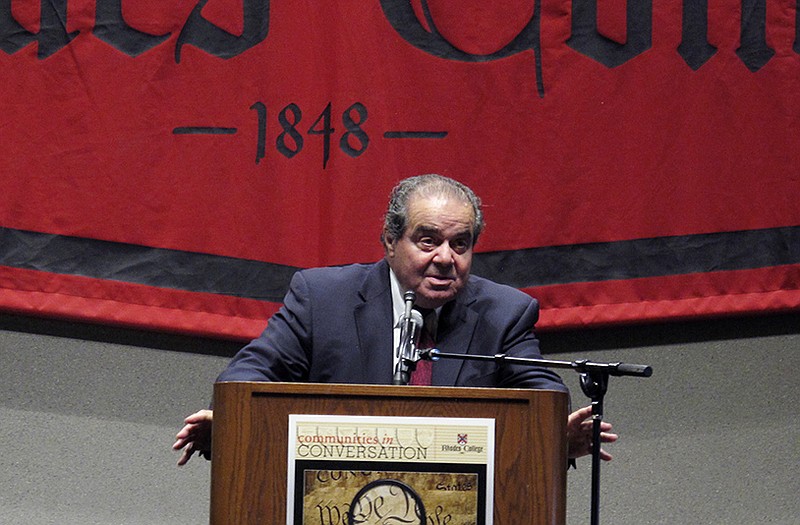MEMPHIS, Tenn. (AP) - U.S. Supreme Court Justice Antonin Scalia on Tuesday criticized judges who believe the Constitution is a "living" document, saying they amount to policy makers who are rewriting it and making moral decisions for the entire country about same-sex marriage and other issues. He also referred to this summer's same-sex marriage ruling as "extreme."
Scalia spoke to about 500 people at Rhodes College, where he was invited to deliver the school's annual Constitution Day lecture. He is the longest-serving member of the Supreme Court.
He was appointed by President Reagan in 1986.
In his speech, Scalia distinguished "originalism," which calls for adherence to the original text and meaning of the Constitution when interpreting it, from the theory of a "living" Constitution, which views the document as one that evolves and changes over time without being amended.
"They're not adhering to the text, they're operating as policy makers," Scalia, an "originalist," said of believers in a "living" Constitution. "They're not interpreting the constitution. They're writing one, they're revising one."
Later he added: "What is it that I learned at Harvard Law School that makes me peculiarly qualified to determine such profound moral and ethical questions as whether there should be a right to abortion, whether there should be same-sex marriage, whether there should be a right to suicide?" he asked. "It has nothing to do with the law. Even Yale law school doesn't teach that stuff."
Scalia was among four dissenting justices in the Supreme Court's landmark ruling in June that cleared the way for same-sex couples to marry. Scalia said at the time that he was not concerned so much about same-sex marriage as "this court's threat to American democracy."
On Tuesday, he called the same-sex marriage ruling "the furthest imaginable extension of the Supreme Court doing whatever it wants."
"Saying that the Constitution requires that practice, which is contrary to the religious beliefs of many of our citizens, I don't know how you can get more extreme than that," he said. "I worry about a Court that's headed in that direction."
Scalia also noted that only one sitting Supreme Court Justice, Clarence Thomas, is from the South: The others are from California, New York and New Jersey. He said believers of a "living" Constitution should be upset by that.
"You should be upset because these people are making a new Constitution and they are terribly unrepresentative of the country," he said.
Scalia said judges who believe in an ever-changing Constitution are making it more rigid, not more flexible.
"It's no use talking about abortion anymore. It's just off the democratic stage," he said. "No use arguing about it, coast to coast, now and forever, or unless the Supreme Court changes its mind. Is that flexibility?"
Scalia, a former law professor, also spoke with students in class and had lunch with them earlier in the day.

